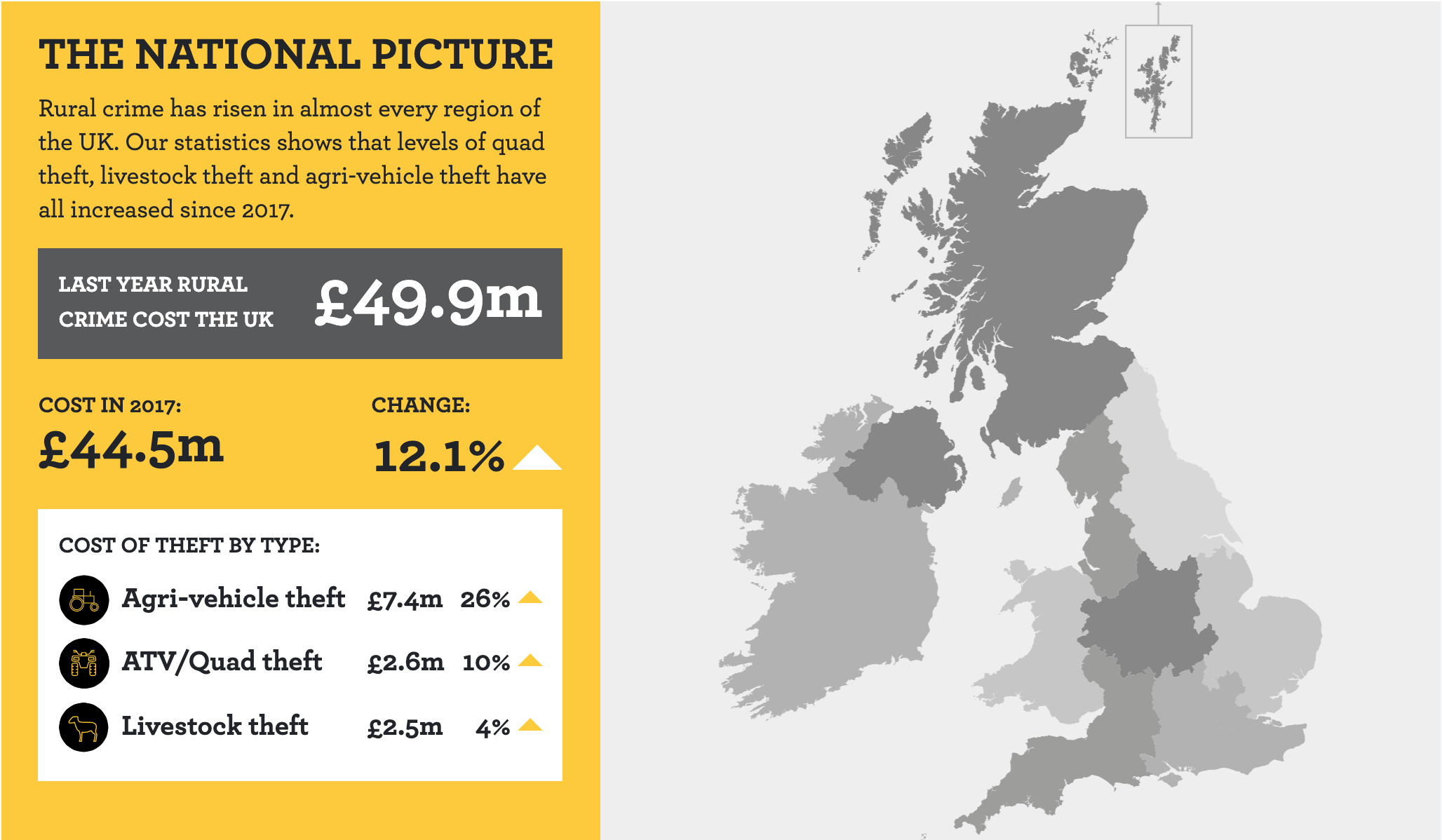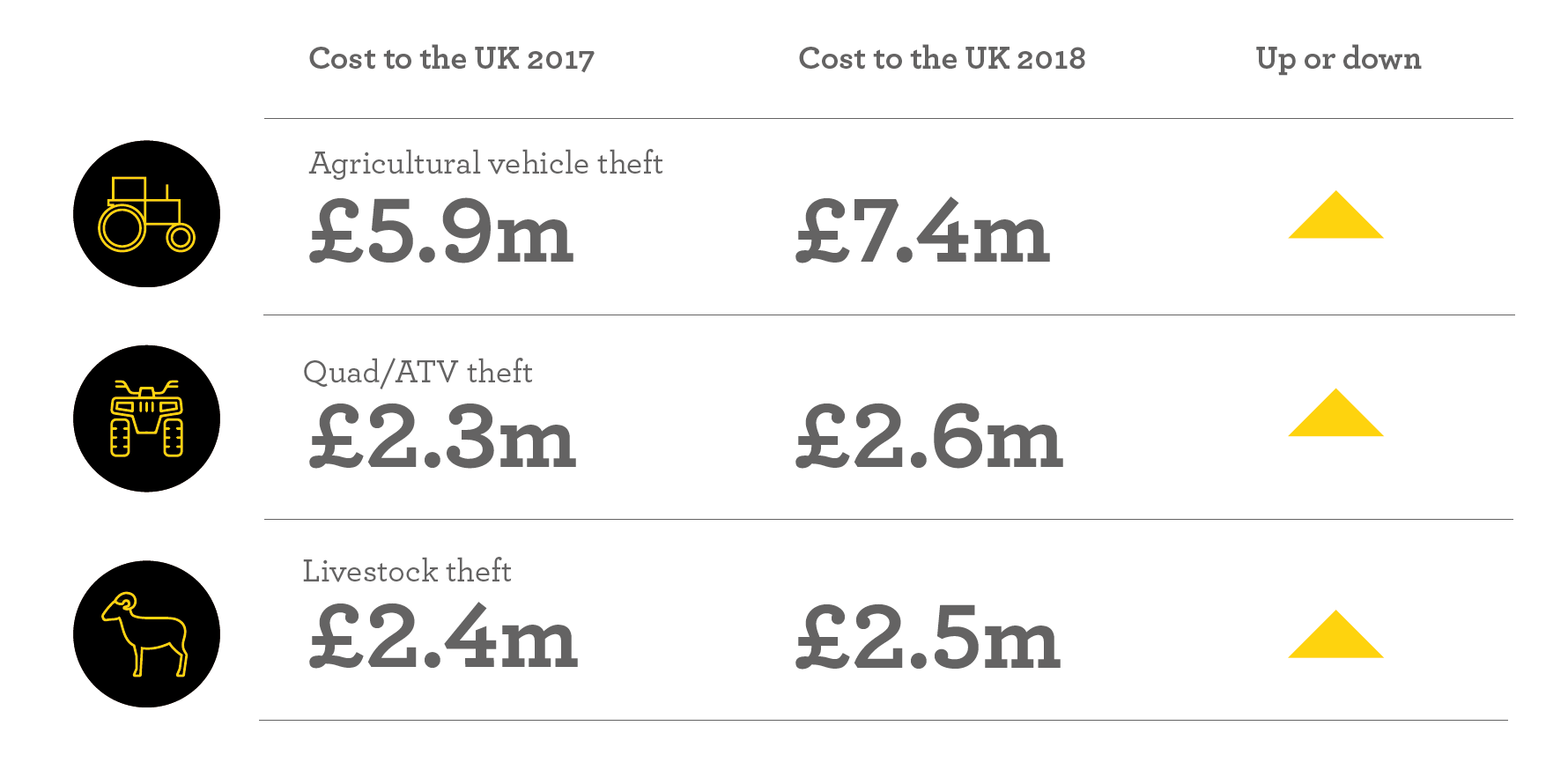Whether it’s cyber crime or dog attacks on livestock, the way rural crime plays out is changing. But how can farmers keep their property safe?
In 2018 the cost of rural crime in the UK reached its highest since 2011. As the UK’s leading rural insurer, providing cover for three quarters of UK farms and rural businesses, we’ve dug into our claims statistics to take a closer look at the key trends and advice.

Trends in rural crime
Cybercrime
Because farms are mostly small businesses without on-site technical support, as they evolve or diversify into areas that are more reliant on IT systems, farmers are increasingly vulnerable to cyber attacks.
The most common range from sending false invoices and using fishing and phishing techniques to obtain sensitive fnancial data, to infecting computers with malicious software and ransomware, or hacking into farm cameras and equipment.
Livestock theft
A generation ago, rustling involved a few animals being taken ‘for the pot’. Today, organised gangs, often using working dogs, can take dozens, sometimes hundreds of sheep in a single night-time raid.
This can be devastating for small farms, where the loss of just a few animals can wipe out profts and disrupt business for years while focks are rebuilt.
Dog attacks on livestock
Every year thousands of sheep are killed or mutilated by dogs. Even if the dog doesn’t make contact, the distress of the chase can cause animals to die or miscarry their lambs.
Dog attacks on farm animals cost £1.2m in 2018. And it’s not just the fnancial loss. For small farmers in particular, the impact it has on breeding programmes can threaten their livelihood.
Fly-tipping
What was once the odd mattress being left at a farm gate has grown into a whole business of bogus waste companies dumping lorry-loads of rubbish in farmers’ felds. Some even pose as genuine tenants, renting land and barns to use as illegal rubbish dumps.
On every scale, fy-tipping is a serious threat – to the health of grazing animals, to the environment, and especially to farmers who are often left to deal with the aftermath themselves.

How to keep your property safe
Farm vehicles
• Mark with the CESAR marking system
• Fit a tracking device and immobiliser enter and drive away the vehicle. And thefts of farm loaders to smash into shops and post offices is another alarming trend this year. Putting lives at risk, these raids have caused damage running into millions of pounds to retail premises and are leading to a permanent loss of cash machines in some areas. Good security is crucial to making life for rural thieves as difficult as possible.
• Use preparatory devices such as Quad Vice to protect quads
• Remove keys when not in use, and store out of sight
• Keep GPS-equipped tractors in secure buildings – or remove kits when not in use
Farms
• Secure doors with five-lever mortice locks or good quality padlocks and locking bars
• Chain and padlock gates to yards and fields when not in use
• Keep fuel tanks in secure compounds and consider a tank alarm
• Store tools and equipment in a specialised security container
• Speak to a professional about fitting an alarm and CCTV
Home
• Never leave keys in locks and always close and bolt windows when you’re out
• Keep fences in good condition
• When you’re out at night, use timers or smart lighting to give the impression someone’s home
• Keep shotguns and firearms locked in a high security gun cabinet or safe
• Consider an alarm and CCTV and combine it with signs to deter thieves
Car
• Keep keyless fobs in a Faraday packet overnight, and don’t leave any keys by windows or letterboxes
• Fit an alarm, tracking device, immobiliser, or all three
• Don’t only rely on electronic security, steering wheel and pedal locks are efective too
• Park in well-lit areas, or install a security light on your driveway
• Never leave valuables in your car overnight
For more on rural crime, check out our EFN profile here, or see our rural crime page here.

